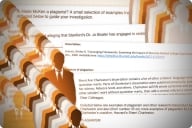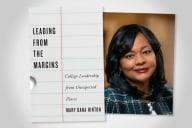You have /5 articles left.
Sign up for a free account or log in.
On Saturday, attendees at the meeting of the Southern Association for Women Historians tweeted about statements participants made there.
Support for the university press director's stance spread online. It turns out that this press director may not be alone in vowing to cancel book contracts of those who harass.
Lisa Bayer, director of the University of Georgia Press, confirmed that she had indeed made the statement, and that she would "cancel a contract if charges proved true" against one of her press's authors or potential authors.
Bayer noted that she has been discussing the issue with fellow members of the Association of University Presses.
Many women who have been subject to sexual harassment in academe report frustration that their harassers continue to be seen as academic stars, leading conferences and scholarly associations, publishing books, and achieving acclaim. As the Me Too movement has gained momentum in academe, some charges have surfaced against prominent professors who have never been investigated by their institutions. Some charges involve alleged incidents from many years ago, making investigations and punishments difficult.
Could scholarly publishing be one tool in the fight against harassment?
Peter Berkery, executive director of the Association of University Presses, said via email that the association is looking at the issue of sexual harassment, "including the question of how to treat authors who have engaged in harassing behavior."
He said the association conducted an "informal survey" this year on the issue. The findings were that "press directors determined their responses on a case-by-case basis" and "they’d welcome more guidance on dealing with these issues."
"The case-by-case determinations reflected a desire to avoid a rush to judgment; where harassment was clear, presses were prepared to act decisively," Berkery said. "While I cannot quantify it, I can tell you that university presses have canceled contracts -- or declined to enter into them -- with authors known to have engaged in harassing behavior."
He added that he believed university presses have the power to make a difference on these issues. He said that decisions would have to be made by individual presses, not the association, on whom to publish.
"Speaking for myself, I do believe that the loss of a book deal has the potential to influence behavior; there’s no question it’s a consequence with teeth. But the real reason a university press would take such an action is more fundamental than meting out punishment: it’s simply the right thing to do, consistent with our community’s values. No harasser should continue to enjoy the benefits of a system he or she has abused," he added.
There are challenges for university presses or others that seek to punish harassers, particularly in the cases (many of which have become public in the last year) where many people believe harassment went on for years, without an official finding against an individual.
Berkery said that his association's board plans to discuss "next steps" on developing policies during the AUP's annual meeting next week in San Francisco. "I think it probable they will appoint a task force charged with cataloging how sexual harassment can arise in the context of university press publishing and recommending appropriate responses and, ideally, even preventatives," he said.
University presses are not the first entities that support research and scholarship to consider a role in fighting sexual harassment.
In February, the National Science Foundation announced new rules under which institutions will have to tell the agency when a principal investigator, co-PI or any other grant “personnel” are found to have committed sexual misconduct or harassment of any kind -- or when the allegations against a PI or co-PI are severe enough to warrant suspension during a campus investigation.








